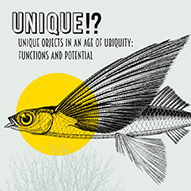
Programme Thursday, September 15, 2022
General Reading Room, Central Library![]()
Preliminary programme
| 9:30 – 11:00 a.m. | Guided City Tour “Regensburg – Experience a Historic City” |
| from 1:00 p.m. | Registration & Coffee |
| 2:00 – 2:45 p.m. | Welcome |
| 2:45 – 3:30 p.m. | Keynote Talk |
| 3:30 – 4:00 p.m. | Coffee Break |
| 4:00 – 4:45 p.m. | In Glass and Stone, in Closets and Drawers: Comparing the Multivalence of Objects in Archival Collections and in the Family Home Eve Neiger, Lead Archivist at Boston Public Library, USA |
| 4:45 – 5:30 p.m. | Atopia. The Unique and the Ethos of the Humanities Prof. Dr. Christian Benne, University of Copenhagen, Denmark |
| 7:00 p.m. | Dinner at Weltenburger am Dom Domplatz 3, 93047 Regensburg (Google Maps) |
Kristian Jensen: Does it Matter if it is Unique? The Acquisition of Heritage Items
The British Library has a formal process of assessing all proposed heritage acquisitions. The process was established to constitute a transparent and accountable method of acquiring items which because of their nature cannot be acquired through standard procurement agreements. It is a process-based definition of “heritage item”, rather than an essentialist one. In this perspective the term “heritage item” has a significant overlap with the term “unique item.” Early on uniqueness was one of the characteristics taken into account when considering an item for acquisition. However, we realised that this criterion did not help us with making decisions, that it did not help with our differentiation between objects which we ought to seek to acquire and those which we should not seek to acquire. In this paper I will seek to theorise why we decided that it was not a helpful process to seek to establish or to deny uniqueness. I will explore other criteria which relate to uniqueness, but which proved more adept for differentiation between items and collections. In doing this I aim to obtain a clearer understanding of the function of objects which we may describe as unique within a cultural institution as well as from the perspective of people who use them for research or who relate to them in other ways.
Eve Neiger: In Glass and Stone, in Closets and Drawers: Comparing the Multivalence of Objects in Archival Collections and in the Family Home
In our everyday lives, we interact with objects, documents, artwork, images, and media, whether physical items, or ephemeral digital materials. Through these interactions, we ascribe distinct meanings to ordinary items, making them unique. This meaning is layered in informational content, context of creation or use, emotional impact, and the item’s role as a carrier of memory. Whether the values and messages embedded in these objects are known to us alone, or can be interpreted by others, varies. Meanings also evolve as ownership passes and time fades memory, or meaning may become static as unique objects are defined and interpreted in a museum or library setting. By comparing the layered and changing meanings and values of unique objects in my family archives and in the Saul Steinberg Papers, held at Yale University, I explore how the uniqueness of objects differs in these two environments of memory. As a professional archivist, I make choices about appraisal, description, and preservation that impact the persistence of meaning. However, these actions, and the meaning of unique objects, are more fluid, personal, and subjective as I apply my profession at home to my grandfather’s papers and belongings. These two men, my grandfather Isaac Neiger, and artist Saul Steinberg, were born five years apart to Eastern European Jewish families in Germany and Romania respectively, and came of age with the rise of fascism. Both fled anti-Jewish persecution and settled as refugees in the United States. I describe patterns in the collecting habits of both men, and examine the changing meanings embedded in the everyday objects throughout their respective archives.
Prof. Dr. Christian Benne: Atopia. The Unique and the Ethos of the Humanities
This talk ask about the ethical assumptions and implications of favouring the unique in the tradition of the humanities.
UNIQUE!? Unique Objects in an Age of Ubiquity : Functions and Potential
International Conference
University of Regensburg, September 15-16, 2022
E-Mail: ub.conference@ur.de



